Donald Trump is not the only one facing a court appearance in connection with 6 January 2021, the day a mob attacked the US Congress building on Capitol Hill.
More than a thousand people, from virtually every state of the union, have been arrested and charged in connection with the attack. According to the US Department of Justice, the approximate numbers include:
· 140 police officers assaulted, comprising about 80 from the US Capitol Police and about 60 from the Metropolitan Police Department.
· 372 defendants charged with assaulting, resisting, or impeding officers or employees, including roughly 112 who have been charged with using a deadly or dangerous weapon or causing serious bodily injury to an officer.
· 11 arrested on charges relating to assaulting a member of the media, or destroying their equipment
· 967 defendants charged with entering or remaining in a restricted federal building or grounds. Of those, 104 are accused of carrying a dangerous or deadly weapon.
· 64 people charged with the destruction of government property, and 51 with the theft of government property.
· More than 310 charged with corruptly obstructing, influencing, or impeding an official proceeding, or attempting to do so.
· 42 defendants have been charged with conspiracy, either: (a) to obstruct a congressional proceeding, (b) to obstruct law enforcement during a civil disorder, (c) to injure an officer, or (d) some combination of the three.
'A serious and growing threat'
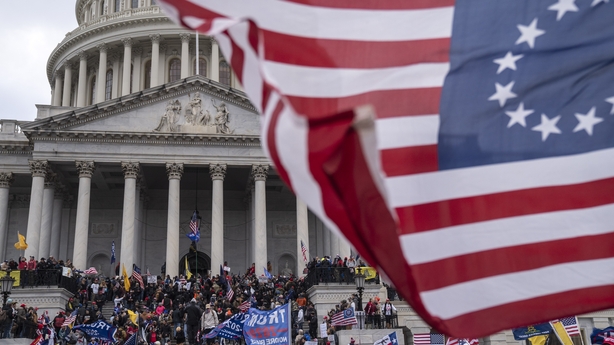
Among those 42 defendants who were found guilty of conspiracy are four members of a right-wing group called the Proud Boys. Two of them were due to be sentenced this week, with prosecutors calling for prison terms of up to 33 years. To date, the longest sentence imposed for 6 January crimes has been 18 years.
However, the sentencing was abruptly postponed today after what was initially called an "emergency" by a spokeswoman for the US Attorney's Office for the District of Columbia.
It was later confirmed that sentencing will take place next week after the judge hearing the case fell ill.
The Proud Boys was founded in 2016, but rose to public prominence during street brawls with Black Lives Matter protesters in several US cities.
Banning the right-wing group in 2021, Canada condemned what it has designated a "terrorist organisation" as posing a "serious and growing threat".
The group featured in one of the 2016 presidential election debates when the then-President Donald Trump said, "Proud Boys stand back and stand-by". The following day he told reporters that he did not know who or what the Proud Boys were, but added that they should stand back and let law enforcement do its work.
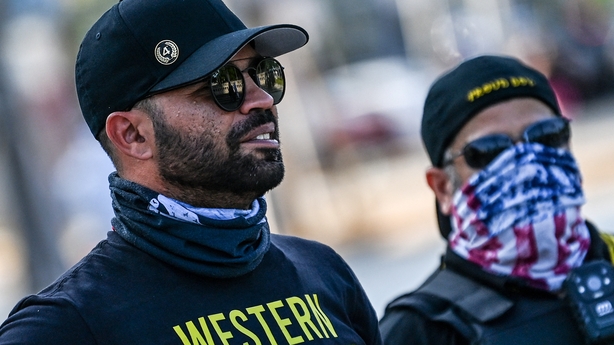
The Proud Boys' leaders – Enrique Tarrio, Joe Biggs, Zachary Rehl and Ethan Nordean – told their trial that they had taken President Trump's remarks and his post-election posts on Twitter as a signal to take part in the rally in Washington on 6 January, and to compel Vice President Mike Pence to certify Mr Trump as the winner of the 2020 Presidential election.
Prosecutors alleged that Tarrio, who was the group's "national chairman", conspired with others to bring about a "revolution". The federal authorities claimed that the Proud Boys had "unleashed a force on the Capitol that was calculated to exert their political will on elected officials by force, and to undo the results of a democratic election".
"The foot-soldiers of the right aimed to keep their leader in power. They failed".
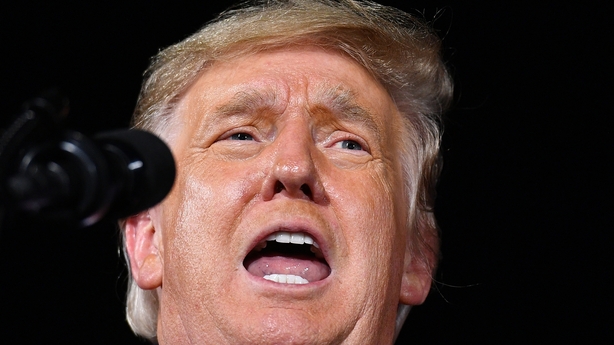
They urged the judge to regard the actions of the Proud Boys not as those of participants in a protest or even a riot, but as terrorism. That narrative accounts for the significantly increased jail time the prosecution is seeking.
The prosecutors claimed that the Proud Boys – who numbered about 200 on the day – were responsible for sparking the most serious phases of the attack on the Capitol, which saw protesters starting fights with police and breaking into the building.
Video showed what appeared to be highly organised units of about a dozen men each, all in military-style helmets and tactical gear, surging through the doors of Congress and moving with purpose through the building.
Nordean, Biggs and Rehl were filmed at the front of the crowd at various stages, joining in skirmishes with police and removing metal bike racks that had been used as barricades to allow the main crowd access to the Capitol's grounds.
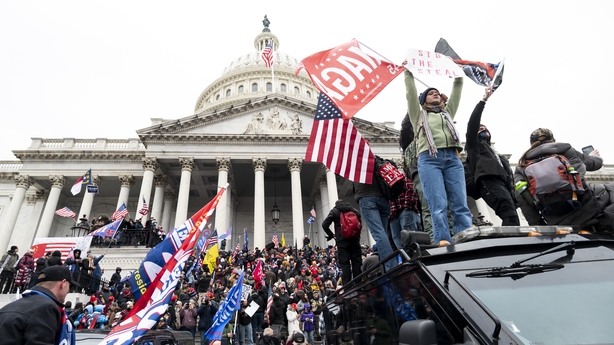
The leader of the Proud Boys, Enrique Tarrio, was not in DC on 6 January. He had been arrested two days previously on charges of burning a Black Lives Matters flag to incite a crowd at a rally the previous December.
Tarrio had known that he would be arrested through an inside source, a Washington DC Metro police officer whom Tarrio had kept contact with and who tipped him off. (The officer has been arrested and faces separate charges.)
Prosecutors claimed that Tarrio had directed the actions of the group via social media and other communication means. Messages referencing 1776, the date of the US revolution, were cited by prosecutors as evidence that the Proud Boys were planning a revolution of their own in a bid to keep Donald Trump in power.
While a fifth member of the Proud Boys, Dominc Pezzola, was acquitted of conspiracy, he was found guilty of other serious charges and will be sentenced this week. Widely seen TV pictures showed Pezzola smashing the windows of the Capitol with a police riot shield.
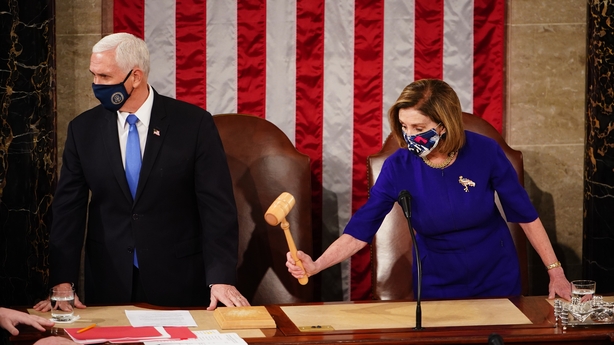
Inside the Capitol, Vice President Mike Pence – in his role as President of the Senate – had been presiding over a joint meeting of the Houses of Congress to carry out his constitutionally specified duty of counting the votes of the Electoral College, the 538 delegates of the individual states who formally elect the US President. (The indictments against Mr Trump in Georgia and the District of Columbia include claims that he was part of a racketeering scheme that set up phoney electors to produce fake votes.)
The four leaders of the Proud Boys were convicted of seditious conspiracy, meaning that they had plotted to overthrow the federal government by conspiring to forcefully oppose the lawful transfer of presidential power. The prosecution case at the four month trial in the DC federal courthouse relied heavily on social media messages between the men.
Their lawyers insisted that these were expressions of dissent protected under the First Amendment, a contention which the jury had roundly rejected.
This latest batch of defendants in the many 6 January-related cases adds to the numbers already jailed or sentenced to home confinement. In the 31 months since the attack on the Capitol, the US Department of Justice says that the following is the outcome to date for those arrested and charged:
Approximate numbers of pleas
· 632 individuals have pleaded guilty to a variety of federal charges, many of whom faced or will face incarceration at sentencing.
· 198 have pleaded guilty to felonies. Another 434 have pleaded guilty to misdemeanors.
· Of those who have been convicted of felonies, 86 have pleaded guilty to federal charges of assaulting law enforcement officers. Approximately 40 additional defendants have pleaded guilty to feloniously obstructing, impeding, or interfering with a law enforcement officer during a civil disorder. Of the 126 defendants in these two categories, 101 have now been sentenced to prison terms of up to 151 months each.
· Four of those who have been convicted of felonies have pleaded guilty to the federal charge of seditious conspiracy.
Trials
· 110 individuals have been found guilty at contested trials, including three who were found guilty in the Superior Court of the District of Columbia. Another 26 individuals were convicted following an agreed-upon set of facts. Putting these two categories together gives 136 defendants; 59 of them were found guilty of assaulting, resisting, or impeding officers and/or obstructing officers during a civil disorder, which are felony offenses. One felon who has been sentenced to more than 14 years in prison.
Sentencings
· Approximately 597 federal defendants have had their cases ruled upon and have received sentences for their criminal activity on 6 January. More than half, roughly 366, have been given jail-time. A further 125 have been sentenced to home detention, including 19 who also were sentenced to a period of incarceration.
The 6 January trials – and arrests – continue.





